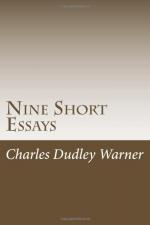“I
would that I might call
A man like him my husband,
dwelling here
And here content to
dwell.”
Is there any woman in history more to be desired than this sweet, pure-minded, honest-hearted girl, as she is depicted with a few swift touches by the great poet?—the dutiful daughter in her father’s house, the joyous companion of girls, the beautiful woman whose modest bearing commands the instant homage of man. Nothing is more enduring in literature than this girl and the scene on the—Corfu sands.
The sketch, though distinct, is slight, little more than outlines; no elaboration, no analysis; just an incident, as real as the blue sky of Scheria and the waves on the yellow sand. All the elements of the picture are simple, human, natural, standing in as unconfused relations as any events in common life. I am not recalling it because it is a conspicuous instance of the true realism that is touched with the ideality of genius, which is the immortal element in literature, but as an illustration of the other necessary quality in all productions of the human mind that remain age after age, and that is simplicity. This is the stamp of all enduring work; this is what appeals to the universal understanding from generation to generation. All the masterpieces that endure and become a part of our lives are characterized by it. The eye, like the mind, hates confusion and overcrowding. All the elements in beauty, grandeur, pathos, are simple—as simple as the lines in a Nile picture: the strong river, the yellow desert, the palms, the pyramids; hardly more than a horizontal line and a perpendicular line; only there is the sky, the atmosphere, the color-those need genius.
We may test contemporary literature by its confortuity to the canon of simplicity—that is, if it has not that, we may conclude that it lacks one essential lasting quality. It may please;—it may be ingenious —brilliant, even; it may be the fashion of the day, and a fashion that will hold its power of pleasing for half a century, but it will be a fashion. Mannerisms of course will not deceive us, nor extravagances, eccentricities, affectations, nor the straining after effect by the use of coined or far-fetched words and prodigality in adjectives. But, style? Yes, there is such a thing as style, good and bad; and the style should be the writer’s own and characteristic of him, as his speech is. But the moment I admire a style for its own sake, a style that attracts my attention so constantly that I say, How good that is! I begin to be suspicious. If it is too good, too pronouncedly good, I fear I shall not like it so well on a second reading. If it comes to stand between me and the thought, or the personality behind the thought, I grow more and more suspicious. Is the book a window, through which I am to see life? Then I cannot have the glass too clear. Is it to affect me like a strain of music? Then I am still more disturbed by any affectations. Is it




